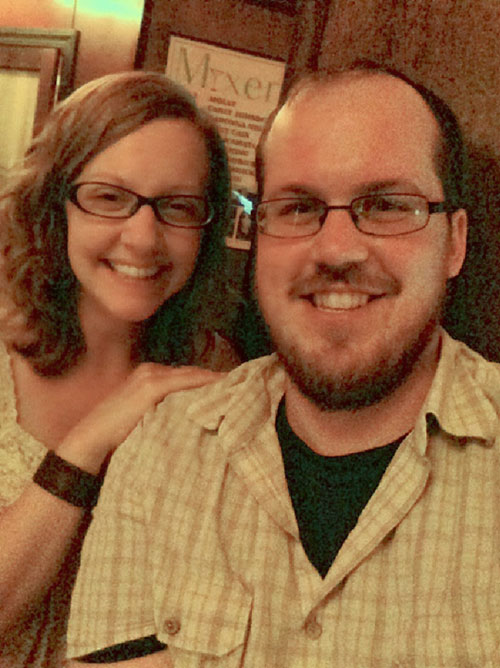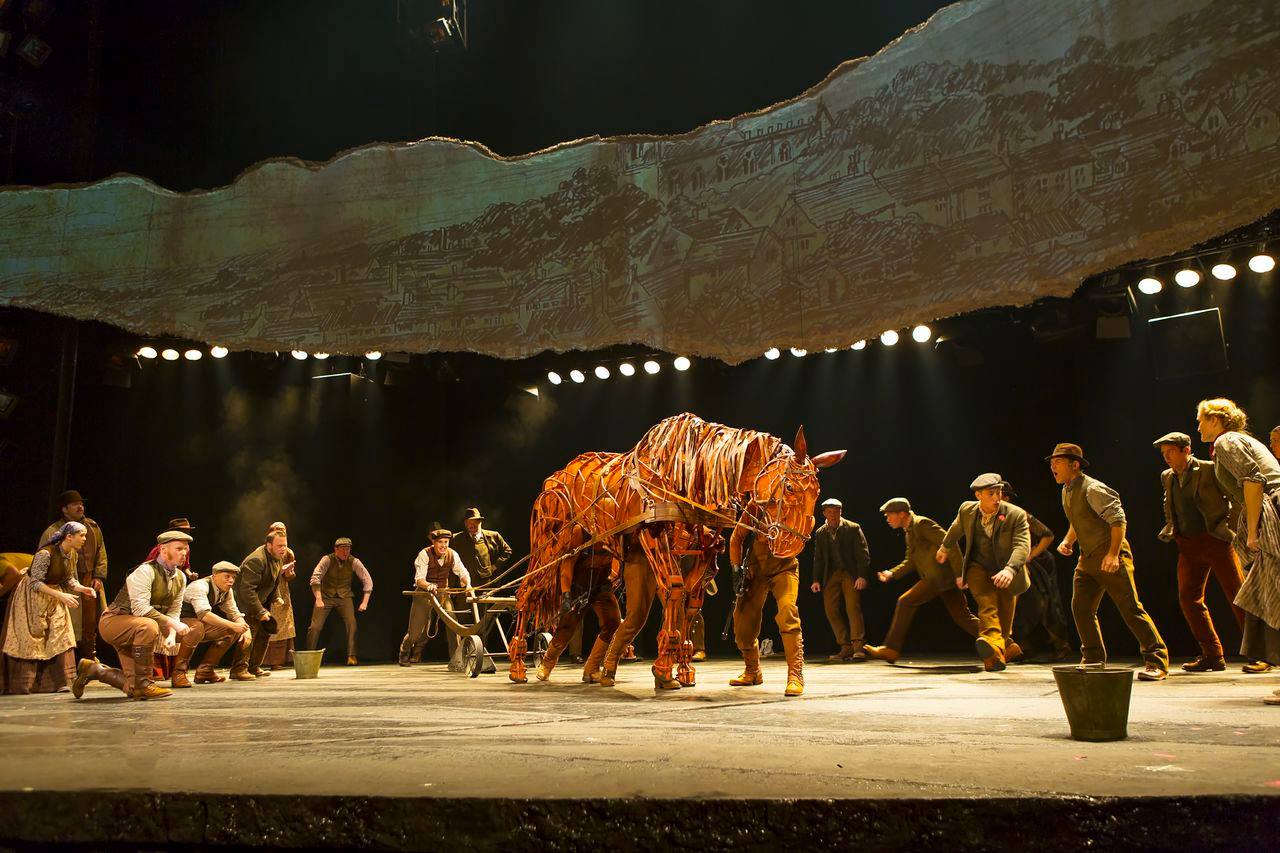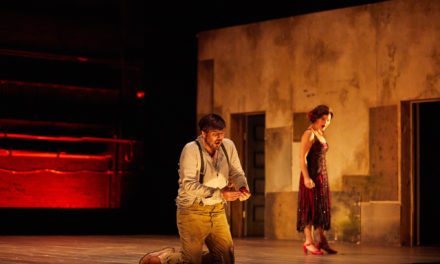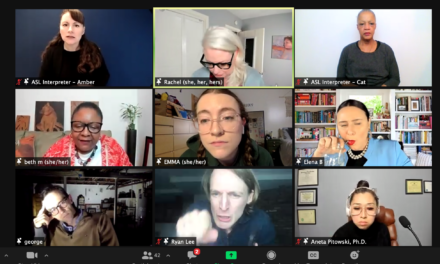| Amy Attaway & John Rooney at Mixer. Smartphone photo by Amy Attaway. |
By Amy Attaway
Entire contents are copyright © 2013 Amy Attaway. All rights reserved.
Amy Attaway, Co-Artistic Director of Theatre [502] and former Associate Director of the Apprentice/Intern Company at Actors Theatre of Louisville, took her replacement, John Rooney, out for some beer and pizza. John started his job as the Assistant Director of the Apprentice/Intern Company in July.
Amy Attaway: John, welcome back to Louisville! You were the intern in the A/I Office in the 2010-11 season, so you’ve been away for a while. What have you been doing since then?
John Rooney: After my internship I went back to Chicago (where I got my undergraduate degree) and pursued my freelance producing and directing career. I ended up as the Associate Artistic Director at Red Tape Theatre as well as working at Steppenwolf on a number of shows as script supervisor – basically helping stage managers and directors with scripts. I did a couple of shows, and this past year I worked as the Interim Executive Assistant to the Dean of the theatre department at DePaul University. I was able to work with the great faculty and staff at DePaul, as well as with the students, at the school where I had gotten my undergraduate degree.
John Rooney: After my internship I went back to Chicago (where I got my undergraduate degree) and pursued my freelance producing and directing career. I ended up as the Associate Artistic Director at Red Tape Theatre as well as working at Steppenwolf on a number of shows as script supervisor – basically helping stage managers and directors with scripts. I did a couple of shows, and this past year I worked as the Interim Executive Assistant to the Dean of the theatre department at DePaul University. I was able to work with the great faculty and staff at DePaul, as well as with the students, at the school where I had gotten my undergraduate degree.
AA: Tell me a little bit about your background – and what on earth made you decide to do an internship at Actors Theatre?
JR: I had gotten my B.F.A. from DePaul University in general theatre studies but with a focus on directing, and during that time I had worked outside the school a bit at various companies. Towards the end of my senior year, I was interning at The About-Face Theatre, and Erica Sartini (who was an intern at ATL years before I was) was working in casting. Erica turned to me and said, “Hey, there’s this internship. Do you want to go to Louisville?” I didn’t really know about ATL at the time, although I had heard of the Humana Festival, and I said SURE! Certainly! Let’s go! So she hooked me up with you. The internship worked out perfectly for me because it was this random kind of internship that no other theatres did, where I was helping to run the Apprentice/Intern company, and it allowed me artistic and producing opportunities.
JR: I had gotten my B.F.A. from DePaul University in general theatre studies but with a focus on directing, and during that time I had worked outside the school a bit at various companies. Towards the end of my senior year, I was interning at The About-Face Theatre, and Erica Sartini (who was an intern at ATL years before I was) was working in casting. Erica turned to me and said, “Hey, there’s this internship. Do you want to go to Louisville?” I didn’t really know about ATL at the time, although I had heard of the Humana Festival, and I said SURE! Certainly! Let’s go! So she hooked me up with you. The internship worked out perfectly for me because it was this random kind of internship that no other theatres did, where I was helping to run the Apprentice/Intern company, and it allowed me artistic and producing opportunities.
AA: Do you remember your first interview for the internship? You and your sister were driving through Louisville, and you came and sat on the couch in our office, which is now your office.
JR: I do! It just so happened that my sister was finishing up an internship at Disney World, and I flew down to Florida and we drove back to Illinois. It also happened that Louisville was just an hour out of our way and I convinced her to go that way and meet up with you and Michael [Legg, Director of the A/Company]. I remember nobody was in the building, the lights were off in all of the theatres, and we went through the crazy basement, which makes, surprisingly, sense to me now but made no sense at the time, walking up winding staircases in the dark and just barely making out the Bingham Theatre. We went up to the A/I office and were sitting on the couch with my sister next to me, because we couldn’t kick her out into this empty theatre. And we had this terrific interview where the three of us kind of clicked and my sister was there to witness it all.
JR: I do! It just so happened that my sister was finishing up an internship at Disney World, and I flew down to Florida and we drove back to Illinois. It also happened that Louisville was just an hour out of our way and I convinced her to go that way and meet up with you and Michael [Legg, Director of the A/Company]. I remember nobody was in the building, the lights were off in all of the theatres, and we went through the crazy basement, which makes, surprisingly, sense to me now but made no sense at the time, walking up winding staircases in the dark and just barely making out the Bingham Theatre. We went up to the A/I office and were sitting on the couch with my sister next to me, because we couldn’t kick her out into this empty theatre. And we had this terrific interview where the three of us kind of clicked and my sister was there to witness it all.
AA: What do you remember about your intern year that you have held onto as you have moved through your professional career?
JR: Working in the A/I office and working with all forty-ish apprentices and interns really gave me a great sense of how to handle multiple and different personalities – when working on a project, you’d would have to translate it ten different ways so that it would actually be workable for everyone. So that skill was probably the most valuable, especially at Red Tape, which was an ensemble theatre in Chicago. Everybody had different needs and wants and languages in discussing our work.
JR: Working in the A/I office and working with all forty-ish apprentices and interns really gave me a great sense of how to handle multiple and different personalities – when working on a project, you’d would have to translate it ten different ways so that it would actually be workable for everyone. So that skill was probably the most valuable, especially at Red Tape, which was an ensemble theatre in Chicago. Everybody had different needs and wants and languages in discussing our work.
AA: You’ve been on the job now for a little less than two months?
JR: Yeah, just under two months.
JR: Yeah, just under two months.
AA: So is it weird being back in the building as a staff member instead of an intern?
JR: One moment it’s weird and then the next minute it’s completely normal. It’s this weird flux where one minute I know how it all operates and is what’s going on, like I never left, and the next minute I have no clue what you’re talking about. It’s been interesting for me and Michael trying to figure what things I need to know – hopefully before I need to know them, but not always! We just assume that we are on the same page, and we are most of the time. Everyday it’s different. Probably the biggest difference, the most difficult thing to adapt to, is coaching and teaching, specifically. When I was an intern and I was observing it all, I wasn’t physically the one who had to coach and give notes. So learning that language is the thing that I’m adjusting to the most.
JR: One moment it’s weird and then the next minute it’s completely normal. It’s this weird flux where one minute I know how it all operates and is what’s going on, like I never left, and the next minute I have no clue what you’re talking about. It’s been interesting for me and Michael trying to figure what things I need to know – hopefully before I need to know them, but not always! We just assume that we are on the same page, and we are most of the time. Everyday it’s different. Probably the biggest difference, the most difficult thing to adapt to, is coaching and teaching, specifically. When I was an intern and I was observing it all, I wasn’t physically the one who had to coach and give notes. So learning that language is the thing that I’m adjusting to the most.
AA: When you were here before, Marc Masterson was the Artistic Director. How do you think the culture of the organization is different under Les Waters?
JR: I feel the company continues to grow closer and closer, Actors Theatre as a whole. The 50th Anniversary Block Party, as an example, really took every single person in that building to make it happen. We all worked really closely and if, during the party, something happened, five of us would jump on it. We were all on the same wavelength that day, and that was really exciting to see.
JR: I feel the company continues to grow closer and closer, Actors Theatre as a whole. The 50th Anniversary Block Party, as an example, really took every single person in that building to make it happen. We all worked really closely and if, during the party, something happened, five of us would jump on it. We were all on the same wavelength that day, and that was really exciting to see.
AA: I left the position you have now because it was so demanding. I loved it, but it was so time-consuming and so all-encompassing. But I’m still in Louisville because I’m working in Louisville theatre, doing Theatre [502] and freelancing. I know you have been out and about these last couple of months, learning how things work here, seeing things and meeting actors. What is your impression of the Louisville theatre scene? How is it different from the Chicago theatre scene, other than being a smaller town?
JR: That’s an interesting question. I’m actually going to start with the similarities. One of the great things that I love about Chicago theatre that I’m also finding to be true in Louisville is the sense of community: that everybody wants the work to succeed and the arts community and theatre community, specifically, to grow. That’s wonderful. I feel like some other cities are very cutthroat, and Louisville and Chicago are very supportive of everything that’s going on at every level, so I appreciate that a lot. As far as differences, size is the first thing. I don’t know how many theatre companies there are in Louisville, but in Chicago it’s around 300, so that’s the biggest difference.
JR: That’s an interesting question. I’m actually going to start with the similarities. One of the great things that I love about Chicago theatre that I’m also finding to be true in Louisville is the sense of community: that everybody wants the work to succeed and the arts community and theatre community, specifically, to grow. That’s wonderful. I feel like some other cities are very cutthroat, and Louisville and Chicago are very supportive of everything that’s going on at every level, so I appreciate that a lot. As far as differences, size is the first thing. I don’t know how many theatre companies there are in Louisville, but in Chicago it’s around 300, so that’s the biggest difference.
AA: You and I have talked about how things have changed and new things have popped up in the city since you were here three years ago. What is your favorite new discovery in Louisville?
JR: Well, Theatre [502], duh! But it’s interesting, because when I was here in 2011, even NuLu wasn’t there, so that’s all completely different. Now it’s, “Let’s go to the Garage Bar,” as if it’s the thing that everyone knows, and it’s fabulous and I go all the time. Even more than what are the new “things,” the city itself is new to me. Even though I spent nine months here, it’s so different having a car and not being confined to the downtown area, although even downtown has grown a lot. It’s exciting to me to see just how culturally rich and diverse this city is, now that I have the means of transportation to get around.
JR: Well, Theatre [502], duh! But it’s interesting, because when I was here in 2011, even NuLu wasn’t there, so that’s all completely different. Now it’s, “Let’s go to the Garage Bar,” as if it’s the thing that everyone knows, and it’s fabulous and I go all the time. Even more than what are the new “things,” the city itself is new to me. Even though I spent nine months here, it’s so different having a car and not being confined to the downtown area, although even downtown has grown a lot. It’s exciting to me to see just how culturally rich and diverse this city is, now that I have the means of transportation to get around.
AA: It does make a difference. The most important question I have to ask you really is, exactly how big are the shows you have to fill?
JR: Umm…they’re pretty big! (laughing) You would think Amy would have small shoes, given her stature – actually they’re really huge. They have a façade; they’re magical shoes – they just look small. While I’ve experienced all parts of the department, it’s a whole new world – some of which I knew was over there, and some of which I had no clue. It’s been a steep learning curve, but it’s happening. We’ll miss you, Amy, but we’re glad you’re still here.
JR: Umm…they’re pretty big! (laughing) You would think Amy would have small shoes, given her stature – actually they’re really huge. They have a façade; they’re magical shoes – they just look small. While I’ve experienced all parts of the department, it’s a whole new world – some of which I knew was over there, and some of which I had no clue. It’s been a steep learning curve, but it’s happening. We’ll miss you, Amy, but we’re glad you’re still here.
AA: I’m not going anywhere.
JR: Good!
JR: Good!
AA: Last question: What are you most looking forward to this season?
JR: I’m really excited that it is the 50th anniversary and to see all the things that come along with that. I know there’s a great desire to really connect with the community more this year. The Block Party was the prime example of that, but it is the first of many things in which there will be outreach. I’m excited about working with this new group of apprentices and interns to see what they bring to the table. It’s early enough to get a glimpse, but I don’t really know how far we’re going to go. I can’t really say what I knowis going to happen, but I know this year is going to hold some wonderful surprises, both in the main season and in Humana.
JR: I’m really excited that it is the 50th anniversary and to see all the things that come along with that. I know there’s a great desire to really connect with the community more this year. The Block Party was the prime example of that, but it is the first of many things in which there will be outreach. I’m excited about working with this new group of apprentices and interns to see what they bring to the table. It’s early enough to get a glimpse, but I don’t really know how far we’re going to go. I can’t really say what I knowis going to happen, but I know this year is going to hold some wonderful surprises, both in the main season and in Humana.
The first production showcasing the 2013-14 Apprentice/Intern company is:
A/I Company Season: Ensemble Project #1
An Evening of Devised Work
An Evening of Devised Work
October 1 & 2, 2013 at 9 p.m.
Actors Theatre of Louisville
316 West Main Street
Louisville, KY 40202
(502) 584-1205





